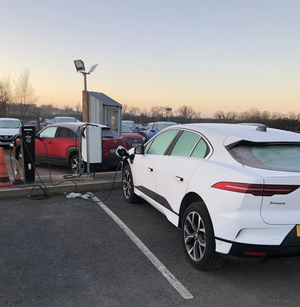Batteries in Cars, and then in Homes - by Jed Marson

BATTERIES IN CARS, THEN HOMES
Every now and again I see articles knocking the battery sustainability in a car.
Batteries have a very long life beyond the vehicle in home energy storage.
In the car - two types of battery performance are key - that is both how fast, and how far.
The problem in the car today is that all the performance and range are needed, because these are early stage products, with technology that needs a bit of Moore's Law step changes to come through in time.
That still improves : computer processors get smaller, faster, and cost less every two or three years. Batteries are getting the competition and investment that will go in a similar direction now.
I get to drive most of the new electric vehicles now.
The latest Nissan Leaf has a significant range increase and that has taken 10 years to more than double.
You see software upgrades from Tesla and owners tell me they get a few more miles each time, but it doesn't, yet, get to a technology leap forward, where the battery longevity performance can be leveraged.
What that would mean would be the 1thousand mile range - and it will come. There is also a user expectation step change - we like a familiar car but it is heav,y and a lighter car is more expensive - take the BMW i3 as the first real electric car for the masses.
It is affordable based on running cost and longevity.
Then the batteries come out and get used again in domestic systems. If I get elected as a County Councillor I will be in a position to influence one change that could make a big difference. I would like to see the battery supply made a competitive market. In addition, a consumer should be able to be supplied with the latest technology, and car makers forced to upgrade software to use the extra range, as battery technology improves.
If you have used batteries for a very long time for serious applications like supporting phone or computer systems as live backup, then you will have experienced batteries that never seem to age.
The stuff we added to servers in the 90s cost as much as a Tesla set now, for a fraction of the time supporting a computer! But they lasted for ages.
This is because they were never allowed to fall below 20% and never charged above 80% (and preferably had a 10% margin) - so only 60% of the battery storage capacity is available.
That unused 40% is too heavy a proposition to wastefully carry in a car, hence the shorter vehicle battery life.
Longer vehicle battery life is possible in many of the new electric cars, if you hardly ever do more than 50 miles a day and manage your batteries, respecting them - which means waiting for them to be 'in condition' - they're a plastic - so you can wreck them by overdoing it, especially when they are cold - accelerating reasonably gently, obeying limits and using regeneration, that is letting the car slow down with anticipation when you slow down, rather than braking hard, as well as lifting off the 'gas pedal' going down hills, which in Herefordshire can be almost perfect recharge down hills!
I can tell you that when I deliver a van and drive on the motorway at 65 instead of 70, the difference in fuel used is massive - 10 to 20% - depending on how high the van is - whatever engine or motor is under the bonnet.
I noticed a sudden software change in the vehicle I bought.
That was plug in, petrol/electric hybrid with a claimed range of 28 electric miles, which dropped to 19 miles after the first visit to the dealer for a software update - presumably designed to do the background protection of the batteries needed.
It was then below my distance to start work, so I had to manage where I polluted - air pollution in towns and cities is more important in older fossil fuel and carbon, whilst in the latest engines with regeneration it is nearly 'only' a carbon problem.
The cost of use of my hybrid was negligible - hardly noticed it on my electricity bill - renewable energy tariff and all.
Sadly, since I have had work cut in Covid, I sold it back to a main dealer and now use the Euro 4 diesel Landy we bought new in 2007 and keep for the heavy stuff around the horses, which now brings a horrible guilt using it and too regular tears to my eyes, putting the expensive diesel in, as that gets a better, cleaner burn at higher temperature and, mercifully, saves a bit of fuel. Maybe I will be able to convert it to electric.
Seriously - we are all green now. Buy an electric car if you intend to do less than 8,000 miles a year.
The electric motor will NEVER wear out.
Batteries will last if you engage your brain to make the techniques lodge in memory muscle, until it becomes as second nature to use the vehicle as effectively as possible.
You may need more than one vehicle for all purposes - it is easy to rent one to do the things that a smaller electric car won't or to have fun.
There is still such a thing as a holiday and air travel is, well, least said about that before hydrogen driven engines, the better.
@JedMarsonLD
Jed Marson

Jed Marson is a Green Liberal Democrat and County Council Candidate in Worcestershire in 2021.
shortcode to this page: http://grn.lib.dm/a81dzL